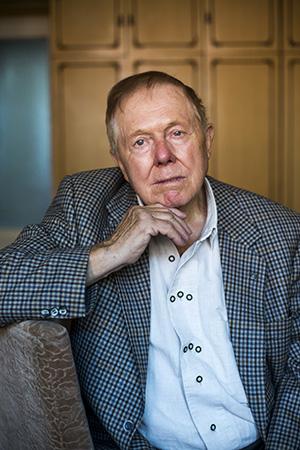
Photo by Andrzej Banaś
Constant beating and hunger produced a sense of anxiety and humiliation, helplessness and sometimes complete despair
Play Broadcast 1
Play Broadcast 2/strong>
The camps were set up by the Germans and were operated by the Germans. The Germans murdered the prisoners. The Germans cremated the bodies. Polish people had nothing to do with it. There were no Polish people there, only anonymous numbers.
Fryderyk Jakimiszyn was born in 1927 in Kraków. He was a Home Army soldier, and is a survivor of the Gross-Rosen concentration camp. On 16 January 1945, seventeen-year-old Fryderyk Jakimiszyn entered the gates of KZ Gross-Rosen in today’s Lower Silesia. The entire area was surrounded by barbed wire electric fences. The sweetish odour of incinerated human bodies produced by the relentless crematoria lingered in the air. Fryderyk Jakimiszyn will not forget this moment to his dying day.
Constant beating and hunger produced a sense of anxiety and humiliation, helplessness and sometimes complete despair, recalls Fryderyk Jakimiszyn. The gruelling toil at the nearby marble quarry only added to the prisoners’ misery. We would work from dawn till dusk. Many prisoners died in the process, he says.
On 8 February 1945, the evacuation of KZ Gross-Rosen began. Fryderyk was transferred to Mittelbau-Dora satellite camp near Nordhausen, where a massive German armaments plant was located. At the beginning of April 1945, he attempted an escape during one of the American air raids. Even though the guards fired their machine guns at the fugitives, I managed to flee the camp along with several other prisoners, says Fryderyk Jakimiszyn. His freedom was not to last for too long, however, as he was captured by a German patrol and transferred to Heinkel, the Sachsenhausen satellite camp in Oranienburg, where he was forced to perform slave labour. He still remembers the Germans and their sense of inevitable defeat. Even so, German orderliness and strict discipline were upheld to the very end, and the killing of the defenceless was rampant, he recalls.
It was by sheer miracle that Fryderyk Jakimiszyn escaped death. When the order to evacuate the camp was given, he took advantage of the haste and chaos among the guards and hid in a dugout, which was used as a bomb shelter. He was tracked down after two hours and taken away to the roll call area. The decision was made to execute him in front of other prisoners, so that everyone would know what their insubordination might bring. Looking into the eyes of death, I resorted to one final act of desperation: I knelt and sobbed and cried for forgiveness. I kissed the German soldier’s boots and shrieked: “I’m still a child, only seventeen years old, I want to go back to my mum.” I was repeatedly hit with a rifle butt and felt absolutely nothing, says Fryderyk Jakimiszyn.
His dramatic plea was successful. Fryderyk Jakimiszyn escaped with his life. He and other prisoners joined the Death March to Berlin, which continued its defence right up to the end of the Second World War. Prisoners were decimated by hunger, disease, and fatigue. The weakest prisoners were shot at the back of their heads, so as not to slow down the march. The roadside trenches were strewn with dead bodies. I saw more dead people than alive in the camps and during evacuation, he says bitterly.



